
Encountering pests in your home is a common annoyance, from the occasional spider in the garage to mosquitoes buzzing around your head· However, when it comes to larger animals like rodents, raccoons, or birds, their deaths can pose significant problems if they happen inside your house· Recognizing the signs of a dead animal in your home is crucial for maintaining a healthy living environment·
Sign Number 1: The Scent
One of the most telltale signs of a dead animal in your home is an unmistakable and persistent foul odor· While it’s difficult to describe the exact smell of a decomposing animal, you will recognize it when you encounter it· This smell can permeate through walls and floors, making it hard to ignore·
How to Identify the Source
Eliminate Other Sources: Before jumping to conclusions, rule out other common sources of bad smells· Check your trash bins for rotting food, inspect the refrigerator for spoiled items, and ensure there are no plumbing issues causing the odor·
Follow the Scent: If the smell persists despite eliminating other sources, try to trace the smell to its origin· Move room to room and check for any changes in the intensity of the odor·
Inspect Hidden Areas: Animals often die in hard-to-reach places like attics, crawl spaces, or within walls· These areas might require more thorough investigation·
Sign Number 2: The Sights
Visual clues can also indicate the presence of a dead animal· These signs may not always be obvious but can be critical in locating the source of the problem·
Common Visual Clues
Flies and Insects: A sudden increase in flies, particularly around a specific area, can indicate a dead animal· Flies are attracted to decomposing bodies and can help you track down the carcass·
Wet Spots and Stains: Decomposing animals go through a stage where their bodies start to liquefy· This process, known as putrefaction, can result in wet spots on walls, ceilings, or floors· These stains are usually dark and accompanied by a strong odor·
Unusual Activity: You might notice other animals or pets showing unusual interest in a particular area· Cats and dogs, for example, may sniff or scratch persistently at a spot where an animal has died·
What Should You Do?
Finding and removing a dead animal yourself can be a daunting and potentially hazardous task· Here’s why you should consider professional help:
Health Risks
Dead animals can carry a host of pathogens that pose serious health risks· Handling them without proper protection can expose you to diseases like Hantavirus, Salmonella, or even plague· Professionals have the necessary equipment and knowledge to handle these risks safely·
Effective Removal
Professionals can accurately locate the dead animal, minimizing the amount of drywall or flooring that needs to be removed· This precision ensures that the process is quick and causes minimal disruption to your home·
Proper Disposal and Sanitization
After removing the dead animal, professionals will properly dispose of the carcass and thoroughly disinfect the area· This step is crucial to eliminate any lingering odors and prevent future pest infestations·
Call Recon Pest Control Services in Melbourne
The safest, most efficient way to handle a dead animal in your home is to contact Recon Pest Control Services in Melbourne· Our team of experts is trained in dead animal removal and can quickly locate and remove the carcass, ensuring your home remains safe and clean·
If you suspect you have a dead animal in your home, don’t hesitate to contact Recon Pest Control Services in Melbourne· Our professionals will handle the situation promptly and effectively, ensuring your home remains a safe and pleasant place to live·
By recognizing the signs of a dead animal and knowing when to call in the experts, you can maintain a healthy and clean living environment· Let Recon Pest Control Services take care of your dead animal removal needs and any other pest control services to keep your home in top condition·

